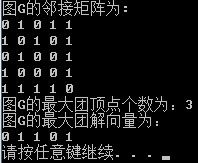0037算法笔记——【分支限界法】最大团问题
问题描述
给定无向图G=(V, E),其中V是非空集合,称为顶点集;E是V中元素构成的无序二元组的集合,称为边集,无向图中的边均是顶点的无序对,无序对常用圆括号“( )”表示。如果U∈V,且对任意两个顶点u,v∈U有(u, v)∈E,则称U是G的完全子图(完全图G就是指图G的每个顶点之间都有连边)。G的完全子图U是G的团当且仅当U不包含在G的更大的完全子图中。G的最大团是指G中所含顶点数最多的团。
如果U∈V且对任意u,v∈U有(u, v)不属于E,则称U是G的空子图。G的空子图U是G的独立集当且仅当U不包含在G的更大的空子图中。G的最大独立集是G中所含顶点数最多的独立集。
对于任一无向图G=(V, E),其补图G'=(V', E')定义为:V'=V,且(u, v)∈E'当且仅当(u, v)∈E。
如果U是G的完全子图,则它也是G'的空子图,反之亦然。因此,G的团与G'的独立集之间存在一一对应的关系。特殊地,U是G的最大团当且仅当U是G'的最大独立集。
例:如图所示,给定无向图G={V, E},其中V={1,2,3,4,5},E={(1,2), (1,4), (1,5),(2,3), (2,5), (3,5), (4,5)}。根据最大团(MCP)定义,子集{1,2}是图G的一个大小为2的完全子图,但不是一个团,因为它包含于G的更大的完全子图{1,2,5}之中。{1,2,5}是G的一个最大团。{1,4,5}和{2,3,5}也是G的最大团。右侧图是无向图G的补图G'。根据最大独立集定义,{2,4}是G的一个空子图,同时也是G的一个最大独立集。虽然{1,2}也是G'的空子图,但它不是G'的独立集,因为它包含在G'的空子图{1,2,5}中。{1,2,5}是G'的最大独立集。{1,4,5}和{2,3,5}也是G'的最大独立集。
算法设计
最大团问题的解空间树也是一棵子集树。子集树的根结点是初始扩展结点,对于这个特殊的扩展结点,其cliqueSize的值为0。 算法在扩展内部结点时,首先考察其左儿子结点。在左儿子结点处,将顶点i加入到当前团中,并检查该顶点与当前团中其它顶点之间是否有边相连。当顶点i与当前团中所有顶点之间都有边相连,则相应的左儿子结点是可行结点,将它加入到子集树中并插入活结点优先队列,否则就不是可行结点。
接着继续考察当前扩展结点的右儿子结点。当upperSize>bestn时,右子树中可能含有最优解,此时将右儿子结点加入到子集树中并插入到活结点优先队列中。算法的while循环的终止条件是遇到子集树中的一个叶结点(即n+1层结点)成为当前扩展结点。
对于子集树中的叶结点,有upperSize=cliqueSize。此时活结点优先队列中剩余结点的upperSize值均不超过当前扩展结点的upperSize值,从而进一步搜索不可能得到更大的团,此时算法已找到一个最优解。
算法具体实现如下:
1、MaxHeap.h
template<class T>
class MaxHeap
{
public:
MaxHeap(int MaxHeapSize = 10);
~MaxHeap() {delete [] heap;}
int Size() const {return CurrentSize;}
T Max()
{ //查
if (CurrentSize == 0)
{
throw OutOfBounds();
}
return heap[1];
}
MaxHeap<T>& Insert(const T& x); //增
MaxHeap<T>& DeleteMax(T& x); //删
void Initialize(T a[], int size, int ArraySize);
private:
int CurrentSize, MaxSize;
T *heap; // element array
};
template<class T>
MaxHeap<T>::MaxHeap(int MaxHeapSize)
{// Max heap constructor.
MaxSize = MaxHeapSize;
heap = new T[MaxSize+1];
CurrentSize = 0;
}
template<class T>
MaxHeap<T>& MaxHeap<T>::Insert(const T& x)
{// Insert x into the max heap.
if (CurrentSize == MaxSize)
{
cout<<"no space!"<<endl;
return *this;
}
// 寻找新元素x的位置
// i——初始为新叶节点的位置,逐层向上,寻找最终位置
int i = ++CurrentSize;
while (i != 1 && x > heap[i/2])
{
// i不是根节点,且其值大于父节点的值,需要继续调整
heap[i] = heap[i/2]; // 父节点下降
i /= 2; // 继续向上,搜寻正确位置
}
heap[i] = x;
return *this;
}
template<class T>
MaxHeap<T>& MaxHeap<T>::DeleteMax(T& x)
{// Set x to max element and delete max element from heap.
// check if heap is empty
if (CurrentSize == 0)
{
cout<<"Empty heap!"<<endl;
return *this;
}
x = heap[1]; // 删除最大元素
// 重整堆
T y = heap[CurrentSize--]; // 取最后一个节点,从根开始重整
// find place for y starting at root
int i = 1, // current node of heap
ci = 2; // child of i
while (ci <= CurrentSize)
{
// 使ci指向i的两个孩子中较大者
if (ci < CurrentSize && heap[ci] < heap[ci+1])
{
ci++;
}
// y的值大于等于孩子节点吗?
if (y >= heap[ci])
{
break; // 是,i就是y的正确位置,退出
}
// 否,需要继续向下,重整堆
heap[i] = heap[ci]; // 大于父节点的孩子节点上升
i = ci; // 向下一层,继续搜索正确位置
ci *= 2;
}
heap[i] = y;
return *this;
}
template<class T>
void MaxHeap<T>::Initialize(T a[], int size,int ArraySize)
{// Initialize max heap to array a.
delete [] heap;
heap = a;
CurrentSize = size;
MaxSize = ArraySize;
// 从最后一个内部节点开始,一直到根,对每个子树进行堆重整
for (int i = CurrentSize/2; i >= 1; i--)
{
T y = heap[i]; // 子树根节点元素
// find place to put y
int c = 2*i; // parent of c is target
// location for y
while (c <= CurrentSize)
{
// heap[c] should be larger sibling
if (c < CurrentSize && heap[c] < heap[c+1])
{
c++;
}
// can we put y in heap[c/2]?
if (y >= heap[c])
{
break; // yes
}
// no
heap[c/2] = heap[c]; // move child up
c *= 2; // move down a level
}
heap[c/2] = y;
}
} 2、6d6.cpp
//最大团问题 优先队列分支限界法求解
#include "stdafx.h"
#include "MaxHeap.h"
#include <iostream>
#include <fstream>
using namespace std;
const int N = 5;//图G的顶点数
ifstream fin("6d6.txt");
class bbnode
{
friend class Clique;
private:
bbnode *parent; //指向父节点的指针
bool LChild; //左儿子节点标识
};
class CliqueNode
{
friend class Clique;
public:
operator int() const
{
return un;
}
private:
int cn, //当前团的顶点数
un, //当前团最大顶点数的上界
level; //节点在子集空间树中所处的层次
bbnode *ptr; //指向活节点在子集树中相应节点的指针
};
class Clique
{
friend int main(void);
public:
int BBMaxClique(int []);
private:
void AddLiveNode(MaxHeap<CliqueNode>&H,int cn,int un,int level,bbnode E[],bool ch);
int **a, //图G的邻接矩阵
n; //图G的顶点数
};
int main()
{
int bestx[N+1];
int **a = new int *[N+1];
for(int i=1;i<=N;i++)
{
a[i] = new int[N+1];
}
cout<<"图G的邻接矩阵为:"<<endl;
for(int i=1; i<=N; i++)
{
for(int j=1; j<=N; j++)
{
fin>>a[i][j];
cout<<a[i][j]<<" ";
}
cout<<endl;
}
Clique c;
c.a = a;
c.n = N;
cout<<"图G的最大团顶点个数为:"<<c.BBMaxClique(bestx)<<endl;
cout<<"图G的最大团解向量为:"<<endl;
for(int i=1;i<=N;i++)
{
cout<<bestx[i]<<" ";
}
cout<<endl;
for(int i=1;i<=N;i++)
{
delete[] a[i];
}
delete []a;
return 0;
}
//将活节点加入到子集空间树中并插入到最大堆中
void Clique::AddLiveNode(MaxHeap<CliqueNode> &H, int cn, int un, int level, bbnode E[], bool ch)
{
bbnode *b = new bbnode;
b->parent = E;
b->LChild = ch;
CliqueNode N;
N.cn = cn;
N.ptr = b;
N.un = un;
N.level = level;
H.Insert(N);
}
//解最大团问题的优先队列式分支限界法
int Clique::BBMaxClique(int bestx[])
{
MaxHeap<CliqueNode> H(1000);
//初始化
bbnode *E = 0;
int i = 1,
cn = 0,
bestn = 0;
//搜集子集空间树
while(i!=n+1)//非叶节点
{
//检查顶点i与当前团中其他顶点之间是否有边相连
bool OK = true;
bbnode *B = E;
for(int j=i-1; j>0; B=B->parent,j--)
{
if(B->LChild && a[i][j]==0)
{
OK = false;
break;
}
}
if(OK)//左儿子节点为可行结点
{
if(cn+1>bestn)
{
bestn = cn + 1;
}
AddLiveNode(H,cn+1,cn+n-i+1,i+1,E,true);
}
if(cn+n-i>=bestn)//右子树可能含有最优解
{
AddLiveNode(H,cn,cn+n-i,i+1,E,false);
}
//取下一扩展节点
CliqueNode N;
H.DeleteMax(N); //堆非空
E = N.ptr;
cn = N.cn;
i = N.level;
}
//构造当前最优解
for(int j=n; j>0; j--)
{
bestx[j] = E->LChild;
E = E->parent;
}
return bestn;
}

